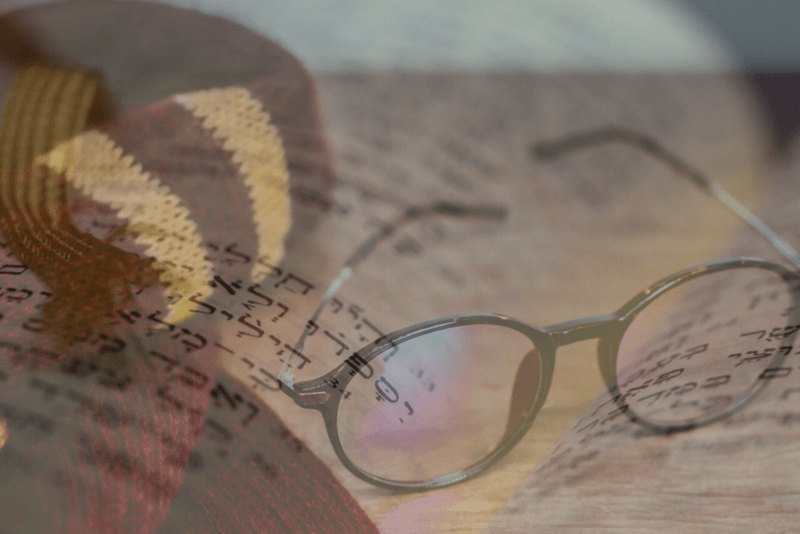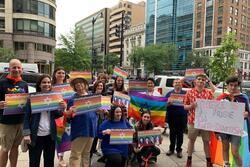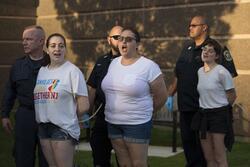How Midrash Helps Me Grapple with J.K. Rowling's Transphobia
Content warning for transphobia, as well as brief mention of ableism, self-harm, drugs, alcohol, assault, racism, and domestic violence.
I have been a Potterhead since I was in third grade.
As someone who grew up in an abusive home and related to Harry living under the stairs, the series was a source of escape, and its world-building gave me a new home. I have read the series and watched the films countless times, dressed up as Luna Lovegood, knitted myself a Hufflepuff scarf, and felt unbelievably happy at the Wizarding World of Harry Potter.
As a nonbinary person, finding out that the creator of my beloved book series is transphobic has been heartbreaking.
J.K. Rowling’s politics don’t come as a huge surprise. Harry Potter is extremely white with token stereotypical diversity: The only Asian character is named Cho Chang, and the other characters of color are minor. There are no queer characters in the series except Dumbledore, who Rowling mentioned is gay after the final book was published. Gringotts’ greedy hooked-nose goblins who work in a bank are not-so-subtle antisemitic caricatures, and the series’ single Jewish character, Anthony Goldstein, is barely mentioned in the books. Like Dumbledore’s queerness, Anthony’s Jewish identity was not confirmed until Rowling tweeted about it after all the books were published, another instance of revisionist representation. The author was also accused of cultural appropriation after Pottermore’s section on Native American magic used vague generalizations and stereotypes about Native magic, drawing backlash from Native leaders and activists. This week wasn’t even the first time that she tweeted transphobic statements.
These past incidents all led me to believe that J.K. Rowling is indeed problematic, but I gave her the benefit of the doubt. “Maybe she doesn’t know what she’s talking about; it isn’t like she’s outright hateful,” I naively thought.
Then this week, I read her 3,600-word essay defending her transphobic ideology, and her blatant bigotry slapped me in the face.
To save you the trouble, and possible trauma, of reading this cringey manifesto, here is a breakdown of her faulty and dangerous arguments, all of which rely on harmful misconceptions and stereotypes about trans people.
- “Bathroom myth”: Rowling believes if trans women are allowed to use women’s restrooms, men will assault women and children. Trans women aren’t predators, and men pretending to be trans women so they can assault women in bathrooms does not actually happen. Furthermore, assault, whether it occurs in a bathroom or elsewhere, is already illegal.
- “Transness is just a trend and kids are too young to know they are trans”: Rowling advocates for only adults being able to transition, and for strict medical and psychiatric evaluations before someone can transition, which prevents people from receiving the care they need and perpetuates the myth that all trans experiences are the same. Rowling’s evidence is one flawed study that has faced widespread criticism. Its researcher did not talk to a single trans person, and exclusively spoke to parents who do not believe their child is trans. This study argues that many children choose to transition because their friends are doing so, and many eventually “detransition.” Since trans youth do not undergo irreversible medical transitions, what is so wrong with youth trying new names or clothing if it may affirm their identities? Furthermore, youth are not “peer pressured” into coming out; meeting trans people and spending time in trans-affirming communities helps folks discover their identities! This study also argues that transitioning is a harmful coping mechanism like self-harm, drugs, or alcohol, which is not only transphobic, it does not acknowledge the incredible mental health benefits of allowing children to transition; trans youth face high rates of homelessness, violence, and suicide. Rowling’s essay also delegitimizes the high rates of suicidality among trans youth, claiming that trans activists fabricate these statistics.
- “Many Autistic people are trans”: It is true that there are many Autistic trans people. This fact is used to argue that they were “manipulated” into transitioning. Autistic people are very aware of who they are, and implying that they are incapable of coming to their own identity is ableist.
- “Trans people want to erase women and my womanhood!”: Rowling’s insistence on using the word “women” to describe people who menstruate erases people like me who menstruate and are not women, and invalidates trans and cis women who do not menstruate. If you believe that trans women are women and truly respect their identity, you must acknowledge that menstruation is not exclusive to womanhood. Her Twitter rant about how biological sex determines her womanhood erases those who identify as a gender that is different from their sex. She also argues that if biological sex is socially constructed, homosexual people will be invalidated. This is inaccurate; sex, as well as gender, are not binaries (intersex and nonbinary people exist!) and are determined by social and cultural conditions. Acknowledging this does not invalidate people who are attracted to the same gender or sex. You can read more about the social construction of gender and sex in this article and this book.
Rowling’s main argument is that she takes pride in being a woman and cares about women's issues, particularly because she is a survivor of domestic violence and sexual assault. As a fellow abuse survivor, I am deeply sorry she experienced this harm, and send her solidarity. Yet I cannot condone her weaponizing her trauma against trans people; she insinuates trans people are oppressors when, in reality, trans people, particularly trans women of color, are disproportionately subject to harassment, violence, unemployment, and homelessness. Her harmful rhetoric could not have come at a worse time; just this week, two Black trans women were brutally murdered, and the Trump Administration reversed a rule protecting trans people from discrimination in health care.
I promise you that trans activists are not here to take away your pride in being a woman, or saying that issues women face due to the patriarchy no longer matter. Painting trans people as being at odds with “women’s issues” such as reproductive health, assault, and domestic violence ignores that feminism is intersectional and that trans people face these issues at high rates as well. As marginalized genders, cis women and trans people should be in solidarity with one another, while acknowledging their other intersections such as class, race, and ability.
To marginalized people, discovering that an author is bigoted towards our identities isn’t anything new. Many of the books that I have read, whether historical or contemporary, are by people who wouldn’t support my autonomy for being trans, Jewish, assigned female at birth, or any combination of those. Even the books that form the basis of my religious beliefs, the Torah and Talmud, were written by people who wouldn't let me sit at their table or even acknowledge my existence.
For many folks with marginalized identities, the solution is to avoid engaging with content by problematic creators entirely, and this is a completely valid approach. Yet for me and many others, engaging with these texts is an act of power. We reclaim the content in a way that not just includes us in existing structures, but radically transforms them to affirm our identities.
In my Judaism, this shows up by reading queer and trans Midrash. Midrash is basically Biblical fanfiction, and has existed for thousands of years. Many stories that you may think are “canon,” such as Abraham smashing his father’s idols, are actually Midrash! Some of my favorite queer Midrashim are that Adam was nonbinary, Joseph was trans, and Ruth and Naomi were lovers. I highly recommend checking out Keshet’s resource guide for more.
Similarly, I have been reading queer Harry Potter fanfiction since before I realized I was queer (as if spending hours reading about Fleur and Hermione’s romance wasn’t enough of a hint).
Fans of both Torah and Harry Potter have been making their own representation for years through the power of Midrash, fanfiction, and fan art. There’s something powerful and beautiful about people imagining themselves in source material—whether it’s me relating to Joseph’s ostracization from his family or Harry Potter’s PTSD, or Black readers seeing their own features reflected in Hermione’s hair. That’s what makes Hermione’s Blackness in the Cursed Child stage adaptation, despite the whitewashed book series, so powerful. One could argue that Hamilton is Midrash—the cast being primarily people of color when the figures they’re depicting were white and racist—yet another example of marginalized people who have been excluded by the source material or time period claiming their space.
But what if you don’t want to reimagine Harry Potter at all? If I had enjoyed these books and found refuge and comfort in them exactly as they were written, then, in the words of Hamilton, “that would be enough.” For instance, Svara, a traditionally radical Yeshiva, studies Talmud “through the lens of queer experience.” When I attended their Queer Talmud Camp, I expected everyone to interpret the text with queer characters, but that didn’t even come up in my beit midrash once. Rewriting Talmud wasn’t what made it radical; a room full of people on the margins studying Talmud at all was.
As Daniel Radcliffe, Harry Potter himself, said in his statement for the Trevor Project, “If these books taught you that love is the strongest force in the universe, capable of overcoming anything...if you believe that a particular character is trans, nonbinary, or gender fluid, or that they are gay or bisexual; if you found anything in these stories that resonated with you and helped you at any time in your life—then that is between you and the book that you read, and it is sacred.”
Personally, I have grappled with whether I can ethically separate the material from the creator, whose fortune was made ever so slightly larger by all the HP products I’ve purchased. I ultimately settled on the belief that we can celebrate the work that someone has created without praising the person. But if you don’t want to pick up a Harry Potter book again, that is entirely valid. If you want to continue reading Harry Potter, but reimagine the characters with marginalized identities, or read fanfiction, that is also valid. If you want to read the books just as they are written despite what their author has said, that is valid, too. By existing, we are resisting.








I loved your reflection, thank you so much for sharing it. I study literature, and personally resorted to the "death of the author" mentality (the reader is the once assigning meaning to the text, regardless of what the author may or may not have intended) to cope with Rowling being herself; it's always interesting to see how other people come to terms with loving the books and being very disappointed in the author.
Greetings from Argentina, sorry for the mistakes (English is not my native language),
Perla
Hi Rakhel! I want to thank you for writing this beautifully written post, which quite succinctly and eloquently refutes JK Rowling's points. I stumbled upon your post because I wrote my own on the topic and am looking to see if I can publish it elsewhere (You can read mine here: https://artinmotionblog.blogspot.com/2020/06/response-to-jk-rowling.html). Though I'm writing as a straight/cis person, our blog posts are so similar in sentiment. It's amazing how many people must be processing this similarly but in our own ways. I also love your Jewish lens on the topic (I live in Chicago and svara is awesome!).
The only thing I take a bit of issue with is the goblin-anti-Semistim link that I've seen thrown around before. As much as I'm hesitant to give Rowling the benefit of the doubt anymore, I think I still will on this topic. It seems clear that goblin-lore is filled with negative portrayals of short, greedy folks who deal with money. These traits could also appear in anti-Semitic stereotypes/caricatures of Jews by chance or it could be that goblin lore is rooted in anti-Semitism. I'm not sure we'll ever know, but I'm willing to go with the assumption that the goblins were...well..just goblins. This is a good summary: https://momentmag.com/debunking-the-harry-potter-anti-semitism-myth/
In either case, thank you for your writing!